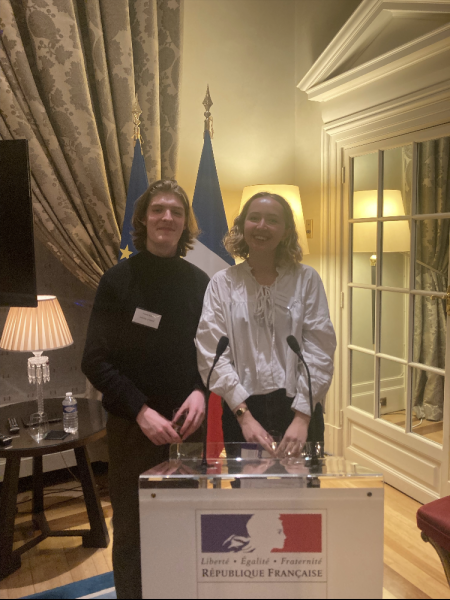
The iconic Prix Goncourt was first awarded in 1903 for ‘the best and most imaginative prose work of the year’ and since then, each year, writers fulfilling such criteria have received a token reward—currently €10. Those chosen, of course, also have the honour of their work appearing alongside previous winners: hallowed names such as Marcel Proust, Simone de Beauvoir, and Marguerite Duras. The selection process is rigorous; the jury meets on the first Tuesday of every month in the Restaurant Drouant in Paris, frequented by Edmond de Goncourt himself in his last years. Equally thorough is the Choix Goncourt UK: an international version in which university students across the United Kingdom take up the position of literary judges to determine the best text.
Michaelmas term, then, consisted of venturing into the four novels shortlisted for the Choix Goncourt: Le Voyage dans l'Est (Christine Angot), La Plus Secrète Mémoire des Hommes (Mohamed Mbougar Sarr), Enfant de Salaud (Sorj Chalandon), and Milwaukee Blues (Louis-Philippe Dalembert).
Oxford's panel was composed of 12 students and researchers. The first meeting was at All Souls College. Our deliberations, however, stretched across Oxford: we also held meetings in Wadham College, the Maison Française d'Oxford, and, with the spectre of Covid-19 still looming, supplemented these by frequent virtual communication. All of us, I believe, found a radical freedom in being able to discuss and interpret four new novels, books not yet marked by the influence of academic opinion under which we have so often felt pressured into plain agreement. We discussed what exactly constituted an imaginative piece of prose and, despite the diversity of opinions expressed in the meetings, a clear winner emerged: Mbougar Sarr.
On March 25th, Caitlin Russell (Wadham) and I met with students from 14 other universities at the Institut Français in London for the final deliberation. First, each pair of delegates spoke at length in French of the book which they passionately believed to be the most deserving of the prize. There was no immediate or clear favourite. Rather, each book proved to be uniquely excellent and, even if they shared certain themes, each author approached them in radically inventive and different ways. After the final speech was delivered, we set about discussing the merits and shortfalls of each text, as well as the very criteria with which to judge the books. The way Angot exhausts language until it reflects the trauma at the heart of the narrative seemed to move all of us deeply. Similarly, the gentle intimacy of Dalembert’s work and Chalandon’s restrained journalistic style were also praised.
Indeed, there was perhaps a certain hesitancy to pick Mbougar-Sarr, who had already won the Prix Goncourt the previous November. It was as if, in our role within the vastly assembled network of the Choix Goncourt, we were meant to see that which had failed to catch the attention of the traditional Goncourt jury. But, in the end, the imaginative depth and merit of the book captivated all of us. We would, indeed, choose La Plus Secrète Mémoire des Hommes, a book which we all agreed was a skilled and subversive patchwork of literary influence: interrogating both the motives of the figure of ‘The Author’ and the entire literary project. It is a book, perhaps best summarised by one of its lines: ‘L’alternative devant laquelle hésite le cœur de toute personne hantée par la littérature : écrire, ne pas écrire.’[1] That evening, the delegates assembled at the French Residence, and the proclamation of our decision was made. Speeches by Didier Decoin (President of the Académie Goncourt), Catriona Seth (Marshal Foch Professor of French Literature), and the French Ambassador, Her Excellency Madame Catherine Colonna, also confirmed the fruitful outcome of all our efforts.
The Choix Goncourt was not only an opportunity to read four inventive and contemporary books but also a chance to explore, if only for a day, a nexus of literary and cultural exchange. Indeed, we were also able to hear the emergence of even newer literary voices during an interview with Lucile Génin on the process of writing her book De Nouveaux Endroits, as well as engaging in discussion on interpretation and where exactly the meaning of literature is located. Such is the nature of both the Prix Goncourt and the Choix Goncourt: inextricably rooted in France’s literary past and reaching endlessly into a new literary future of radical form and reflection, extending beyond borders and forming an international, cultural community.
[1] The alternative in front of which the heart of anyone haunted by literature hesitates: to write or not to write.